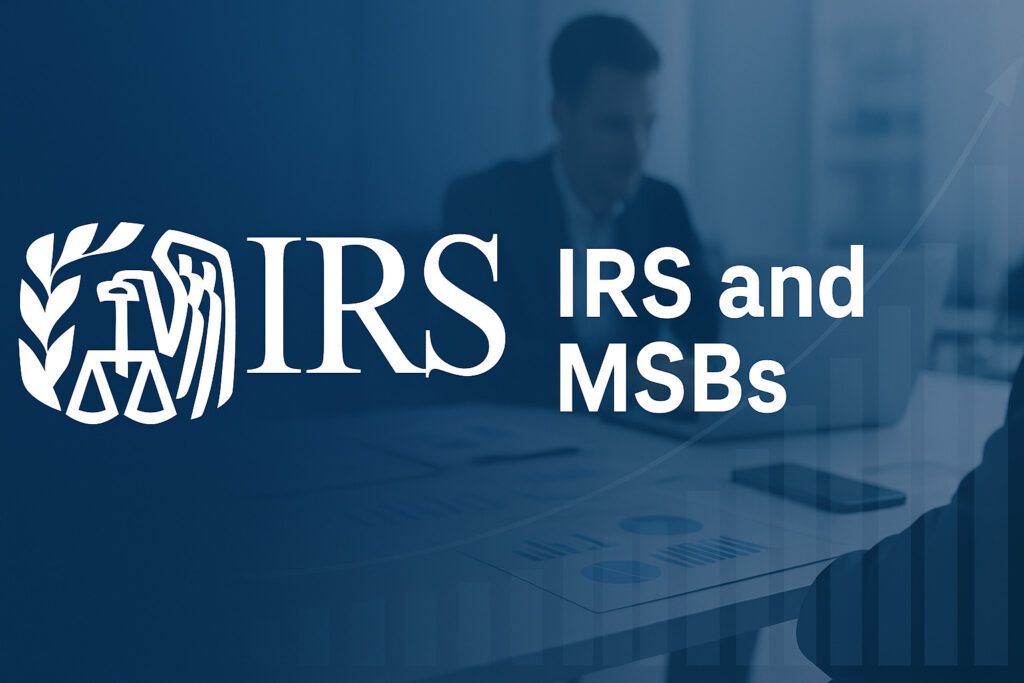1. What Defines an MSB Under U.S. Law?
According to the IRS, a Money Services Business (MSB) includes any entity offering services such as check cashing, foreign currency exchange, or the handling of money orders, traveller’s checks, or prepaid access products exceeding $1,000 per person per day. Additionally, anyone operating a money transmission business, regardless of the monetary volume, qualifies as an MSB. This definition also extends to administrators or exchangers of virtual currencies.
2. The IRS’s Role in the Bank Secrecy Act (BSA) Framework
First enacted in 1970, the Bank Secrecy Act (BSA) established extensive record-keeping and reporting rules to combat financial crimes, including money laundering and terrorist financing. While the BSA is administered by the Treasury’s Financial Crimes Enforcement Network (FinCEN), the IRS plays a key role:
- Conducting examinations to ensure MSB compliance with BSA/AML requirements.
- Providing guidance and enforcing AML program requirements to ensure businesses develop robust risk-based plans.
3. Registration, Reporting, and Compliance Obligations
Federal Registration
All MSBs must register using FinCEN Form 107 within 180 days of commencing operations. Registration must be renewed biennially, and documentation must be retained for at least five years.
AML Program Requirements
MSBs must implement a documented Anti-Money Laundering (AML) compliance program tailored to their risks and designed to prevent misuse for illicit purposes.
Transaction Reporting
- Transactions over $10,000 per person per day must be reported using FinCEN Form 112 (Currency Transaction Report).
- Suspicious transactions of $2,000 or more must be reported using FinCEN Form 111 (Suspicious Activity Report).
E-Filing Requirements
All BSA forms—including MSB registration, CTRs, and SARs—must be filed electronically through FinCEN’s BSA E-Filing System.
4. Enforcement, Examination Tools, and Risk Oversight
The IRS uses examination protocols to assess MSB compliance. This includes reviewing transaction patterns for structuring, examining voided and daily transaction logs, and determining whether reporting thresholds are intentionally circumvented.
The MSB Examination Manual, co-developed by FinCEN and the IRS, provides inspectors with a framework to evaluate compliance with BSA/AML obligations.
5. Summary Table: IRS Responsibilities for MSBs
| Responsibility Area | Details |
| Definition of MSBs | Entities handling money transmission, cashing, currency exchange, or virtual currency above thresholds. |
| Registration Compliance | Form 107 filing within 180 days, biennial renewal, and five-year record retention. |
| AML Program Oversight | MSBs must implement a written AML program tailored to their risk profile. |
| Reporting Obligations | Form 112 for transactions over $10K; Form 111 for suspicious activity of $2K or more. |
| Electronic Reporting Required | All filings must go through FinCEN’s BSA E-Filing System. |
| Examination & Enforcement | IRS conducts audits, reviews structuring risks, and applies the MSB Examination Manual. |
Why This Matters
Understanding the IRS’s role in the regulation of MSBs is crucial for:
- Regulatory Compliance: Meeting federal thresholds, reporting deadlines, and filing requirements.
- Operational Integrity: Developing and maintaining an AML program aligned with IRS standards.
- Risk Mitigation: Preparing for audits or examinations based on structured protocols and potential enforcement actions.

